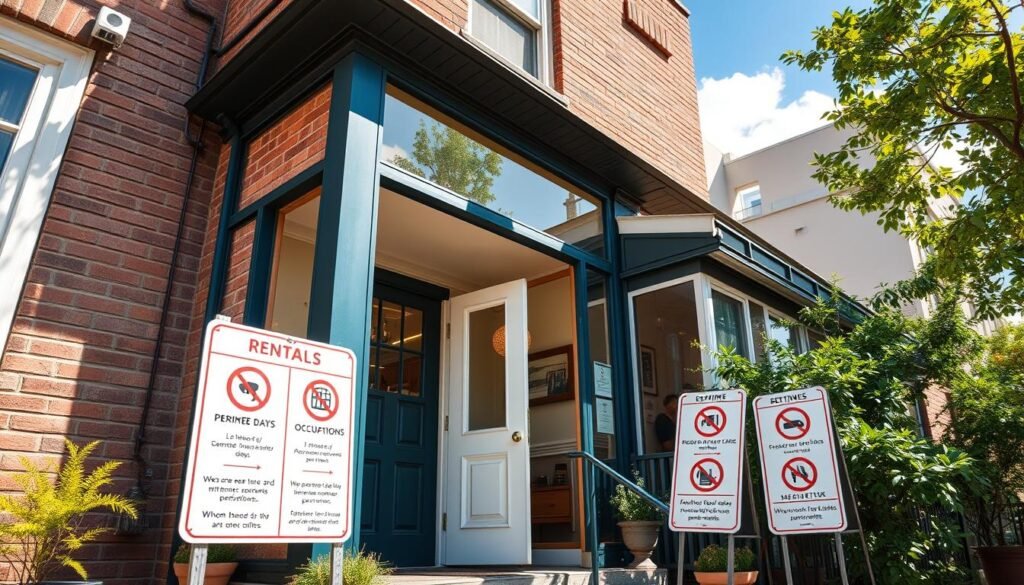Did you know that the global short-term rental market is expected to reach a staggering $93.1 billion by 2027, growing at a compound annual rate of 5.7%? The rise of the home-sharing economy has transformed the way we travel, offering a diverse array of vacation rental options that provide unique experiences and cost-effective accommodations. As the popularity of short-term rentals continues to soar, it’s crucial for both travelers and property owners to understand the pros and cons of this dynamic industry.
This comprehensive guide delves into the intricacies of the short-term rental market, exploring the growth trends, key platforms, and popular destinations. It examines the advantages of short-term rentals, such as the potential for additional income for property owners, increased flexibility and control, unique experiences for guests, and the positive impact on local economies. Additionally, the article addresses the potential drawbacks, including regulatory challenges, impact on housing markets, and concerns over noise and disruption.
Whether you’re a seasoned traveler seeking budget-friendly accommodations or a property owner considering entering the home-sharing market, this article provides valuable insights to help you make informed decisions. By understanding the complexities and nuances of the short-term rental industry, you can navigate the opportunities and overcome the challenges with confidence.
Key Takeaways
- The global short-term rental market is expected to reach $93.1 billion by 2027, reflecting the industry’s rapid growth.
- Short-term rentals offer unique experiences, cost-effective accommodations, and potential for additional income for property owners.
- Regulatory challenges, impact on local housing markets, and concerns over noise and disruption are some of the potential drawbacks of short-term rentals.
- Understanding the pros and cons of the short-term rental industry is crucial for both travelers and property owners to make informed decisions.
- This article provides a comprehensive guide to navigating the complexities and nuances of the short-term rental market.
Introduction to Short-Term Rentals
In the ever-evolving hospitality industry, short-term rentals have emerged as a significant disruptor, offering travelers a fresh alternative to traditional hotel accommodations. Platforms like Airbnb have revolutionized the way people approach vacation rentals, providing a diverse range of unique and personalized lodging options.
Short-term rentals, also known as vacation rentals, refer to the temporary leasing of private homes, apartments, or other residential properties for a short period, typically ranging from a few nights to a few weeks. This model has gained immense popularity among both travelers and property owners, as it offers a more intimate and authentic experience compared to traditional hotels.
- Travelers can enjoy the comforts of a home-like setting, with access to amenities like kitchens, living rooms, and multiple bedrooms, often at a lower cost than a hotel.
- Property owners, on the other hand, can generate additional income by leveraging their unused or underutilized spaces to cater to the growing demand for unique vacation experiences.
The rise of short-term rentals has had a significant impact on the hospitality industry, challenging the traditional dominance of hotels and resorts. This shift has given rise to a more diverse and dynamic vacation rentals landscape, empowering both travelers and property owners to explore new possibilities in the world of accommodation.
As the short-term rental market continues to evolve, it is important for both hosts and guests to stay informed about the latest trends, regulations, and best practices to ensure a seamless and enjoyable experience.
Overview of the Short-Term Rental Market
The home-sharing economy has revolutionized the tourism management industry, with platforms like Airbnb leading the charge. As the popularity of short-term rentals continues to soar, it’s essential to understand the key trends and factors shaping this dynamic market.
Growth Trends in Short-Term Rentals
The short-term rental industry has experienced remarkable growth in recent years, driven by the increasing demand for more personalized and authentic travel experiences. According to industry reports, the global short-term rental market is projected to reach a valuation of over $100 billion by 2025, expanding at a CAGR of around 7% during the forecast period. This growth trajectory underscores the significant impact of short-term rentals on tourism management and the home-sharing economy.
Key Platforms for Hosting
- Airbnb remains the dominant player in the short-term rental market, boasting a vast network of listings across the globe.
- Other popular platforms include Vrbo, HomeAway, and Booking.com, each offering unique features and targeting specific segments of the market.
- Emerging platforms like Vrbo and Expedia are also gaining traction, catering to the diverse needs and preferences of both hosts and guests.
Popular Destinations for Short-Term Rentals
The rise of short-term rentals has had a significant impact on tourism management in various destinations. Major cities like New York, London, and Paris have seen a surge in Airbnb listings, while smaller, off-the-beaten-path locations have also experienced a boost in short-term rental activity, offering travelers unique experiences and opportunities to explore local communities.
| Destination | Short-Term Rental Growth |
|---|---|
| New York City | 12% annual growth |
| London, UK | 9% annual growth |
| Paris, France | 11% annual growth |
| Asheville, North Carolina | 15% annual growth |
| Reykjavik, Iceland | 13% annual growth |
The data in the table highlights the significant growth in short-term rental activity across a diverse range of destinations, underscoring the widespread impact of the home-sharing economy on tourism management worldwide.

Advantages of Short-Term Rentals
Short-term rentals offer a range of benefits for property owners, guests, and local economies. From providing additional income streams to creating unique experiences, these vacation rental options are becoming increasingly popular worldwide.
Additional Income for Property Owners
One of the primary advantages of short-term rentals is the ability for property owners to generate additional income. By renting out their homes, apartments, or condos on a short-term basis, owners can supplement their regular income and offset the costs of property ownership. This can be especially beneficial for those with underutilized or investment properties.
Flexibility and Control for Hosts
Short-term rental platforms give hosts greater flexibility and control over their properties. Hosts can choose when to make their space available, set their own rates, and tailor the guest experience to their preferences. This level of autonomy allows hosts to optimize their rental strategies and maximize their earnings potential.
Unique Experience for Guests
Travelers often seek out short-term rentals for the opportunity to immerse themselves in local communities and experience a more authentic destination. Short-term rentals can provide guests with unique amenities, personalized service, and a sense of home that is difficult to replicate in traditional hotel settings. This can lead to more memorable and enriching vacation experiences.
Growth of Local Economies
The rise of short-term rentals has had a positive impact on local economies, particularly in popular vacation destinations. Guests staying in these rentals tend to spend more money on local businesses, such as restaurants, shops, and activity providers, compared to those staying in traditional hotels. This increased economic activity can lead to job creation and support the growth of small businesses in the area.
| Advantage | Description |
|---|---|
| Additional Income for Property Owners | Short-term rentals allow property owners to generate supplemental income by renting out their homes, apartments, or condos on a short-term basis. |
| Flexibility and Control for Hosts | Short-term rental platforms provide hosts with greater flexibility and control over their properties, including when to make them available and how to tailor the guest experience. |
| Unique Experience for Guests | Short-term rentals can offer travelers a more authentic and immersive experience compared to traditional hotel accommodations, with personalized amenities and a sense of local community. |
| Growth of Local Economies | The influx of guests staying in short-term rentals can lead to increased economic activity and support the growth of small businesses in popular vacation destinations. |
By understanding the advantages of short-term rentals, property owners, guests, and local communities can all benefit from the opportunities these vacation rental options provide.

Disadvantages of Short-Term Rentals
While short-term rentals offer numerous benefits, they also come with potential drawbacks that communities and policymakers must address. Regulatory challenges, impacts on local housing markets, and the potential for increased noise and disruption are some of the key disadvantages associated with the rise of short-term rentals.
Regulatory Challenges
The rapid growth of short-term rentals has outpaced the ability of many local governments to establish clear and comprehensive rental regulations. Hosts often face a complex web of rules and restrictions, varying widely across different jurisdictions. Navigating these regulatory frameworks can be a significant challenge, and the lack of consistent oversight can lead to compliance issues and enforcement challenges.
Impact on Local Housing Markets
The influx of short-term rentals can have a significant impact on housing affordability in local communities. By removing housing units from the long-term rental market, short-term rentals can reduce the overall supply of affordable housing, driving up prices and making it more difficult for residents to find suitable and affordable homes. This can lead to gentrification, displacement of long-term residents, and other local impacts that communities must address.
Potential for Increased Noise and Disruption
Short-term rentals in residential neighborhoods can also contribute to increased noise, traffic, and other disruptions, as guests may not be as familiar with or as invested in the local community as long-term residents. This can lead to conflicts between hosts, guests, and neighboring property owners, requiring careful management and oversight to maintain a harmonious living environment.
“The rise of short-term rentals has presented both opportunities and challenges for communities. Balancing the potential benefits with the need to protect housing affordability and local impacts remains a key priority for policymakers and residents alike.”

As the short-term rental industry continues to evolve, addressing these disadvantages will be crucial for ensuring that communities can reap the benefits of this new form of accommodation while mitigating its potential negative consequences.
Legal Considerations for Hosts
As the short-term rental market continues to thrive, it’s crucial for hosts to understand the rental regulations and property rights associated with the home-sharing economy. Navigating the legal landscape can be complex, but it’s essential for ensuring a smooth and compliant hosting experience.
Understanding Local Laws and Regulations
Each municipality has its own set of rules and regulations governing short-term rentals. Hosts must familiarize themselves with the local zoning laws, licensing requirements, and tax obligations to avoid potential legal issues. Staying up-to-date with changes in regulations is crucial, as they can vary significantly across different regions.
Importance of Permits and Licenses
Obtaining the necessary permits and licenses is a critical step for hosts. Depending on the location, this may include business licenses, short-term rental permits, or even permits for specific property types. Failure to comply with these requirements can result in hefty fines or even the shutdown of the rental operation. Researching the local regulations is a vital part of the hosting process.
By understanding the legal considerations and ensuring compliance with all relevant laws and regulations, hosts can protect their property rights and enjoy a successful and hassle-free short-term rental experience.
| Rental Regulations | Property Rights | Home-Sharing Economy |
|---|---|---|
| Local zoning laws, licensing requirements, tax obligations | Obtaining necessary permits and licenses, compliance with regulations | Navigating the legal landscape, ensuring a smooth hosting experience |

“Staying informed about the legal aspects of short-term rentals is crucial for hosts to protect their interests and avoid potential pitfalls.”
Financial Implications of Short-Term Rentals
As the vacation rentals industry continues to grow, it’s essential for aspiring and experienced hosts to understand the financial aspects of short-term rentals. From the initial investment and setup costs to ongoing maintenance and potential earnings, there are several factors to consider when entering the hospitality industry through platforms like Airbnb.
Initial Investment and Setup Costs
Starting a short-term rental business requires upfront capital. Costs can include property acquisition, renovations, furnishings, and establishing an online presence. Depending on the location and scope of the rental, these expenses can range from a few thousand dollars to tens of thousands.
Ongoing Maintenance and Management Costs
Maintaining a vacation rental property involves regular expenses such as cleaning, utilities, repairs, and property management fees. Hosts must also factor in taxes, insurance, and any necessary licenses or permits. Careful budgeting is crucial to ensure profitability.
Potential Earnings from Short-Term Rentals
The potential earnings from a short-term rental can be attractive, with factors like location, property size, and occupancy rates playing a significant role. Successful hosts often implement dynamic pricing strategies, adjust rates based on demand, and leverage technology to optimize their operations.
| Metric | Average Range |
|---|---|
| Nightly Rate | $100 – $300 |
| Occupancy Rate | 60% – 85% |
| Annual Earnings | $20,000 – $100,000 |
It’s essential for aspiring vacation rentals hosts to thoroughly research the financial implications and plan their investments and operations accordingly to ensure a successful and profitable venture in the hospitality industry.

Safety and Security Considerations
As the home-sharing economy continues to grow, ensuring the safety and security of both guests and property owners has become a critical concern in the hospitality industry. Short-term rental platforms like SociosBnB recognize the importance of addressing these issues to create a safe and enjoyable experience for all.
Ensuring Guest Safety
Hosts must prioritize the well-being of their guests by implementing a range of safety measures. This includes ensuring smoke detectors, fire extinguishers, and first-aid kits are readily available, as well as providing clear emergency exit plans. Proper lighting, secure locks, and a reliable communication system can also help guests feel secure during their stay.
Property Security Measures
Protecting the host’s property is equally vital in the rental regulations of the home-sharing economy. Hosts should consider installing security cameras, alarms, and secure entry systems to deter any unwanted access. Regular property inspections and thorough vetting of guests can also help mitigate the risks associated with short-term rentals.
By addressing these safety and security considerations, hosts can create a welcoming and trustworthy environment that appeals to guests and ensures the long-term success of their rental business within the hospitality industry.

| Safety Measure | Description |
|---|---|
| Smoke detectors | Ensure properly functioning smoke detectors are installed throughout the rental property. |
| Fire extinguishers | Provide easily accessible fire extinguishers in key locations. |
| First-aid kits | Maintain well-stocked first-aid kits for minor injuries or emergencies. |
| Secure locks | Utilize high-quality locks on all doors and windows to deter unauthorized access. |
| Security cameras | Install security cameras to monitor the property and deter any criminal activity. |
Guest Experience in Short-Term Rentals
In the hospitality industry, providing an exceptional guest experience is crucial for the success of vacation rentals. The key to creating a memorable stay for short-term rental guests lies in effective communication and offering personalized recommendations to enhance their overall experience.
Importance of Communication
Clear and open communication between hosts and guests is essential for setting expectations, addressing concerns, and ensuring a smooth rental experience. Hosts should be prompt in responding to inquiries, provide detailed information about the property and local area, and maintain regular check-ins throughout the guest’s stay. Effective communication helps to build trust, foster positive relationships, and ultimately, lead to more positive reviews and repeat bookings.
Providing Local Recommendations
- One of the main advantages of staying in a short-term rental is the opportunity to immerse oneself in the local community. Hosts can enhance the guest experience by providing personalized recommendations for the best restaurants, attractions, and activities in the area.
- By offering insider knowledge and suggestions, hosts can help guests make the most of their vacation and feel like a local, rather than a tourist. This personalized touch can differentiate the short-term rental experience from a traditional hotel stay, fostering a deeper connection between the guest and the destination.
By prioritizing clear communication and offering personalized local recommendations, hosts in the tourism management and hospitality industry can create an exceptional guest experience in their vacation rentals, leading to positive reviews, repeat bookings, and the growth of the short-term rental market.

“The true essence of hospitality lies in creating a memorable experience that leaves a lasting impression on our guests.”
Comparison of Short-Term Rentals and Traditional Hotels
When it comes to accommodations, travelers today have a wide range of options to choose from, including short-term rentals and traditional hotels. As the hospitality industry continues to evolve, understanding the differences between these two accommodation types can help travelers make informed decisions that best suit their needs and preferences.
Pricing Differences
One of the primary differences between short-term rentals and traditional hotels is the pricing structure. Short-term rentals, such as those offered through platforms like Airbnb, often provide more competitive pricing, particularly for longer stays or group bookings. Travelers can find a wider range of options at various price points, allowing them to tailor their accommodations to their budget. In contrast, traditional hotels may have a more standardized pricing model, with rates that can fluctuate based on factors like location, amenities, and demand.
Amenities and Services Offered
Traditional hotels typically offer a more comprehensive set of amenities and services, such as on-site restaurants, fitness centers, and 24-hour front desk support. Short-term rentals, on the other hand, often provide a more personalized and self-contained experience, with fully equipped kitchens, laundry facilities, and more living space. This can be particularly appealing for travelers who prefer the flexibility and privacy of a home-like setting.
Customer Experience
The customer experience can also vary between short-term rentals and traditional hotels. While hotels often provide a more consistent and predictable experience, short-term rentals can offer a more unique and authentic flavor of the local area. Vacation rentals can provide an opportunity for travelers to immerse themselves in the community and interact with their hosts, potentially leading to a more memorable and personalized experience.
| Criteria | Short-Term Rentals | Traditional Hotels |
|---|---|---|
| Pricing | More competitive, especially for longer stays or groups | Standardized pricing model, with rates fluctuating based on factors like location and demand |
| Amenities and Services | Offer a more personalized and self-contained experience, with fully equipped kitchens and laundry facilities | Provide a more comprehensive set of amenities and services, such as on-site restaurants, fitness centers, and 24-hour front desk support |
| Customer Experience | Can offer a more unique and authentic experience, with opportunities for travelers to immerse themselves in the local community | Provide a more consistent and predictable experience |
Ultimately, the choice between short-term rentals and traditional hotels will depend on the individual traveler’s preferences, budget, and the specific needs of their trip. By understanding the key differences between these accommodation options, travelers can make more informed decisions and find the option that best suits their vacation rentals and hospitality industry needs.

Best Practices for Successful Hosting
In the thriving home-sharing economy, successful short-term rental hosting requires a strategic approach. From creating an inviting space to implementing effective marketing strategies, hosts in the hospitality industry can maximize their success and stand out in the competitive Airbnb market.
Creating an Inviting Space
The key to attracting and delighting guests lies in the presentation of your rental property. Invest time and effort into curating an inviting and comfortable space that reflects your personal style and the local charm. Pay attention to details such as cleanliness, amenities, and thoughtful decor to ensure a memorable stay for your guests.
Effective Marketing Strategies
Successful hosting in the home-sharing economy requires a strong marketing approach. Leverage the power of online platforms like Airbnb to showcase your property, highlighting its unique features and competitive advantages. Engage with potential guests through personalized communication, responsive customer service, and positive reviews to build a loyal following.
- Optimize your listing with eye-catching visuals and compelling descriptions
- Utilize dynamic pricing strategies to stay competitive
- Cultivate a strong online presence and leverage social media channels
- Encourage guests to leave positive reviews and testimonials
By implementing these best practices, hosts can create a welcoming environment, attract a steady stream of guests, and thrive in the ever-evolving short-term rental market.

“Successful hosting is about more than just renting out a space – it’s about crafting an exceptional experience that keeps guests coming back.”
The Future of Short-Term Rentals
As the home-sharing economy continues to evolve, the future of short-term rentals looks promising. Industry experts predict that the sector will continue to see significant growth, driven by the tourism management needs of the hospitality industry and shifting guest preferences.
Predictions for Industry Growth
According to recent studies, the global short-term rental market is expected to expand at a rapid pace over the next decade. Key factors driving this growth include the increasing popularity of vacation rentals among travelers, the rise of remote work, and the continued digitalization of the hospitality industry.
Emerging Trends in Guest Preferences
- Demand for unique, authentic experiences: Travelers are seeking more personalized and immersive accommodations that offer a glimpse into local culture and communities.
- Emphasis on sustainability and eco-friendliness: Guests are increasingly prioritizing environmentally sustainable short-term rental options.
- Preference for flexible booking and cancellation policies: The COVID-19 pandemic has highlighted the importance of flexibility in travel planning, and guests are now seeking more lenient booking and cancellation terms.
To stay ahead of the curve, short-term rental providers must adapt to these emerging trends and continue to innovate their offerings to meet the evolving needs of the home-sharing economy.
| Trend | Description | Impact |
|---|---|---|
| Unique Experiences | Travelers seek accommodations that offer a more authentic, immersive experience. | Drives demand for unique, locally-inspired short-term rentals. |
| Sustainability | Guests prioritize eco-friendly and sustainable short-term rental options. | Encourages short-term rental providers to implement green practices and highlight their sustainability initiatives. |
| Flexible Policies | Travelers prefer short-term rental options with flexible booking and cancellation policies. | Requires short-term rental providers to offer more lenient and adaptable booking terms. |
As the home-sharing economy continues to evolve, short-term rental providers must stay attuned to these trends and adapt their offerings to meet the changing needs of guests. By embracing the future of short-term rentals, the tourism management and hospitality industry can capitalize on the growing demand for unique, sustainable, and flexible accommodations.

Conclusion: Making Informed Decisions
As we have explored the intricate landscape of short-term rentals, it’s clear that this dynamic sector presents both opportunities and challenges for property owners, guests, and local communities. Understanding the pros and cons of the vacation rental and home-sharing economy is crucial in making informed decisions about participating in this evolving industry.
While the potential for generating additional income and offering unique experiences for guests are enticing, short-term rentals also come with regulatory hurdles, impact on local housing markets, and the risk of disruption to neighboring residents. Careful consideration of your local laws, financial implications, and the overall impact on your community should be at the forefront of your decision-making process.
“Navigating the world of short-term rentals requires a delicate balance between personal gain and community responsibility.”
Ultimately, the choice to participate in the home-sharing economy should be based on a thorough understanding of your specific circumstances, goals, and the potential consequences, both positive and negative. By weighing the pros and cons, you can make an informed decision that aligns with your priorities and contributes to the sustainable growth of the short-term rental industry.

Key Considerations for Informed Decisions
- Understand your local laws and regulations regarding short-term rentals
- Carefully evaluate the potential financial implications, including initial investments and ongoing costs
- Assess the impact of short-term rentals on your local housing market and community
- Prioritize guest safety and security measures to ensure a positive experience
- Stay informed about industry trends and emerging best practices for successful hosting
By approaching the short-term rental market with a balanced perspective and a commitment to responsible hosting, you can navigate this dynamic landscape and unlock the benefits of the home-sharing economy while minimizing the potential drawbacks.
Resources for Further Information
For readers seeking to delve deeper into the world of short-term rentals, there is a wealth of information available from various sources. Exploring the recommended books and articles on the topic can provide valuable insights into the history, trends, and best practices within the vacation rentals and home-sharing economy.
Books and Articles on Short-Term Rentals
From industry-leading publications to academic studies, there are numerous resources that offer a comprehensive understanding of the short-term rental market. Some notable titles include “The Airbnb Story: How a Bunch of Rebels and Mavericks Reinvented an Industry” by Leigh Gallagher and “The Rise of the Sharing Economy: Exploring the Challenges and Opportunities of Collaborative Consumption” edited by Pia A. Albinsson and B. Yasanthi Perera.
Websites and Online Forums
Several websites and online forums provide up-to-date information, industry news, and peer-to-peer discussions on the short-term rental landscape. Popular platforms like SociosBNB offer a wealth of resources, including packing guides and travel tips, catering to both hosts and guests in the vacation rentals industry.
Industry Associations and Groups
Staying connected with industry associations and professional groups can be invaluable for short-term rental hosts and enthusiasts. Organizations such as the Vacation Rental Management Association (VRMA) and the Vacation Rental Housekeeping Professionals (VRHP) offer educational resources, networking opportunities, and advocacy support for those operating in the hospitality and home-sharing economy.
FAQ
What are the key advantages of short-term rentals?
The main advantages of short-term rentals include providing additional income for property owners, offering more flexibility and control for hosts, creating unique experiences for guests, and contributing to the growth of local economies.
What are the potential disadvantages of short-term rentals?
Some of the potential disadvantages of short-term rentals include regulatory challenges, impacts on local housing markets, and the potential for increased noise and disruption in neighborhoods.
What legal considerations do hosts need to be aware of?
Hosts must understand and comply with local laws, zoning restrictions, and licensing requirements to operate a short-term rental legally. Failure to do so can result in fines and other legal issues.
How do the financial implications of short-term rentals compare to traditional vacation rentals?
Short-term rentals can provide higher potential earnings, but hosts must also account for initial investment, ongoing maintenance, and management costs. Carefully analyzing the financial aspects is crucial for success.
What safety and security measures should hosts implement?
Ensuring guest safety and property security are essential. Hosts should implement measures such as securing valuables, verifying guest identities, and having clear protocols for emergencies.
How can hosts create exceptional guest experiences in short-term rentals?
Effective communication, providing local recommendations, and offering personalized touches can significantly enhance the guest experience and lead to positive reviews.
How do short-term rentals compare to traditional hotels in terms of pricing, amenities, and customer experience?
Short-term rentals often offer more competitive pricing, unique amenities, and a more personalized customer experience compared to traditional hotels. However, hotels may provide more standardized services and on-site support.
What are some best practices for successful short-term rental hosting?
Key best practices include creating an inviting space, implementing effective marketing strategies, optimizing pricing, and maintaining clear communication with guests.
What are the predictions and emerging trends in the short-term rental industry?
Industry experts predict continued growth in the short-term rental market, with evolving guest preferences, technological advancements, and potential regulatory changes shaping the future of the industry.



